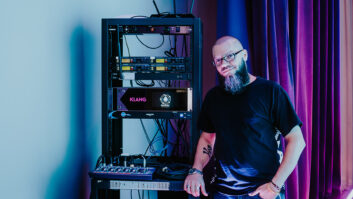Besides accurately predicting the Federal Reserve Board rate cut about a week before it was made, William C. Freund, chief economist emeritus of the New York Stock Exchange was optimistic about U.S. economic trends for the next 12 to 18 months.
During his lively presentation at the Consumer Electronics Association CEO Summit, held at the Vail Cascade Resort and Spa, here (see story, p. 28), Freund commented, “The recession is over, but there is no boom ahead. But we will see respectable growth.”
Freund discussed a wide range of factors that have and will continue to effect the economy now and in the foreseeable future during his talk.
He said, even though the Gross National Product (GNP) grew in each quarter during 2002, it was a “false signal” of economic health. “The 2.5 percent growth of 2002 was inadequate. The economy needs to grow by 3 percent to keep unemployment where it is.” The unemployment rate is “6.1 percent and it is understated,” due to a dramatic increase in part-time workers and a significant loss in jobs.
Calling it a “growth recession,” but not a deep downturn, he expects the economy to “come out of the doldrums next year,” with businesses finally “loosing their purse strings for investment” vs. what happened in previous years. Freund reported that during the first quarter the GNP was up 2 percent and should be up 3 percent by the second half.
He said the problem with the 1995-to-2000 period on Wall Street was an “over-investment” in not only tech stocks but companies in “the real economy too.” He added, “The IPOs of the late ’90s were a time of madness. Over-valued companies, plus Sept. 11, the fragile economy, Afghanistan, Iraq and the corporate misdeeds all hurt.”
Maybe it is due to his background on Wall Street, but Freund noted, “The stock market is a reliable economic indicator. Stock market investors have been afraid of missing the boat on an upbeat market and buying. The stock market usually goes up or down significantly six months before a turn in the economy.”
Freund said election year 2004 will be “a significant year,” because he believes that President George W. Bush will not repeat the mistakes of the elder Bush concerning the economy. Freund predicted 4 percent “real growth” in the U.S. economy and improved corporate earnings.
During the next 12 to 18 months, Freund said there are “reasons for optimism,” due to lower interest rates, tax cuts [and] lower oil prices,” and that “consumer confidence should rise and retail sales will increase.” He reported government figures showing consumer electronics, major appliances and furniture stores are up 3 percent this year.
While Freund agrees with Bush Administration policy to cut taxes during a sluggish economy, “My problem is massive deficits in the next 10 years, with Medicare and Social Security costs rising. There will be 80 million baby boomer retirees ? [resulting] in deficits over $500 billion a year.”
Still he is optimistic. “The dot-com era is over, but the Internet Age is beginning.” PCs, telecommunications and the Internet in the 21st century “will be as significant as cars in the 20th and railroads in the 19th centuries,” he said. “The sun has not yet set on our country. I believe it is still morning in America.”












